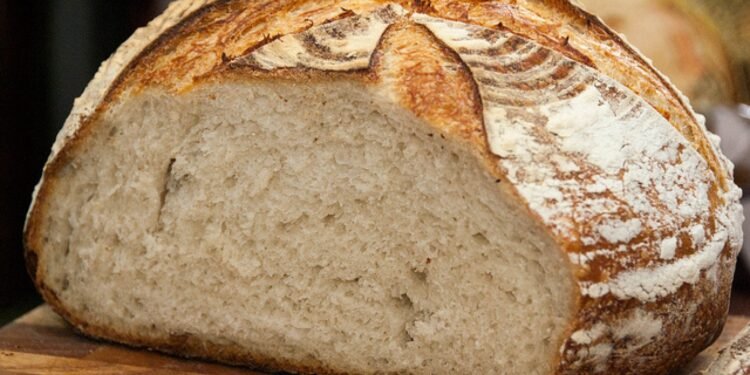The Health Benefits Of Sourdough Bread

As many of us have been stuck at home during the pandemic, bread baking quickly become one of the most popular activities to undertake at home. Stores have found it impossible to cope with the sudden surge in demand with little to offer in the baking section but empty shelves.
Many avid home bakers, undeterred have managed to source flour from local mills or online stores. The availability of yeast caused some profiteers to resell for 10$ a pack on eBay causing an alternative to being sought.
Because of these challenges, sourdough bread has become extremely popular!
With the majority of restaurants closed and going out a health risk, those that aren’t making their own bread are buying it to change-up their weekly eating routine!
What is sourdough bread?
Sourdough is a live culture of naturally fermented flour used to leaven bread. A sourdough starter is made from flour and water. There is no need to add any yeast, the sourdough contains natural yeasts extracted from its environment.
There are plenty of airborne yeasts which become absorbed by the culture, gradually changing its form. It takes 7-14 days of regular feedings of flour and water for a new sourdough culture to develop enough wilds yeasts and enzymes to be able to raise a loaf of bread.
Once a leaven has been created, providing it is regularly fed it will last forever. My sourdough starter is 4 years old, which is still classed as fairly young!!
What are the health benefits fo eating sourdough
Lactic bacteria
As the sourdough starter ferments, it contains high amounts of lactic acid. This is the “twang” flavour that makes sourdough bread stand out from yeast leavened bread. The acid neutralizes the level of phytates which allows our bodies to absorb more of the minerals found in flour.
Better digestion
Many people struggle to eat bread due to digestion issues. Digesting carbohydrates is said to be a problem for 4 in 10 of us according to an article by the NHS. Digestion problems cause upset stomachs, indigestion, constipation or diarrhoea, heartburn and bloated feelings after eating certain products. The usual remedy offered by doctors is to make changes in diet and lifestyle habits.
Several sufferers find that converting to sourdough or artisan bread relives their unpleasantness. The improvement in digestion comes from a long amount of time the bread is made.
Unlike commercial store-bought bread, a slow process without additives, enzymes and improvers allows the bread to form naturally. More starch is broken down leading to an easier to digest bread that is full of more complex bacteria making it great for our bodies system.
You eat less of it
Sourdough has more flavour, fuller smell and is better absorbed by fillings than sliced bread. Generally, sourdough bread is more satisfying and therefore less is eaten in a portion. If watching your diet to control weight gain it is best not to devour half a loaf of bread in an afternoon!
How to make sourdough even better for you
We know sourdough bread is good for our body, but how can we get the most health benefits from eating it? Here are a few tricks that I use to keep things healthy:
Make sourdough bread yourself
The majority of sourdough bread producers are artisan bakers. Authentic producers will use just flour, water and salt to make sourdough. But there are a few that add extras like yeast or additional enzymes to speed up production. You can always ask the producer to check the label, or to be sure, make your own.
Making sourdough yourself is fresher and not going to run any risk of containing any naughty factory ingredients. It’s great fun too!
Use wholemeal flour
Wholemeal flour contains the bran of the flour grain. The flour has more fibre and an increase in complex starch particles which are better for the body than white. Complex starch particles are more challenging to break down so they give us a steady stream of energy.
Wholemeal homemade bread can often be a little bit dense and challenging to make. It is best baking with 30% wholemeal flour and 70% white flour to start with, later you can increase the ratio of wholemeal to make a healthier bread if you like.
Add seeds
Seeds are a great source of fibre. They also contain healthy monounsaturated fats, polyunsaturated fats and many important vitamins, minerals and antioxidants. They help to reduce cholesterol, blood sugar which leads to better blood pressure. Seeds are also delicious!
Adding some seeds to a dough creates an amazing flavour and works amazingly well with poached eggs…..Yum.
Make long shapes instead of round
When proofing the bread, most people use a round shaped banneton. I find this hard to cut and you end up with massive chunks of bread that you don’t need and don’t want to waste so I end up with more than I intended.
If you use a long shaped banneton, portion size is much easier to control.
Why is making bread good for you
Making bread at home has a very calming effect on me. I love the process of doing something creative with my hands, sometimes with the radio but often in silence. It’s methodic and very relaxing, many people who suffer from anxiety find bread baking calms them down.
Kneading by hand is great exercise too, you can adopt a hard-hitting physical approach for maximum gluten strength or a more gentle, take-your-time method. Either works fine and makes eating bread all that more rewarding.
How to start making your own sourdough bread
If you create a new starter you can be up and running in 7 days! Once you’ve built your starter, all you have to do is feed it once a week and you will have fresh bread ready to go for life.
You will need a few pieces of equipment in order to make sourdough bread:
- A banneton, bread proofing basket which is used to proof (raise) the dough
- A baking stone or dutch oven vessel to bake the bread with
- Serrated knife or bakers “lame”
- Various kitchen equipment, such as bowls, scales and baking paper.
The ingredients used to make your own healthy sourdough bread are simply flour. Water and salt. You can use either baker’s flour or all-purpose flour for sourdough bread. Sea salt is preferred as it does not contain any anti-caking agents.
For a full step by step course in making sourdough view the sourdough beginners course at Busby’s Bakery School. It tells you everything you need to know so you can make a hassle-free sourdough bread fast.






